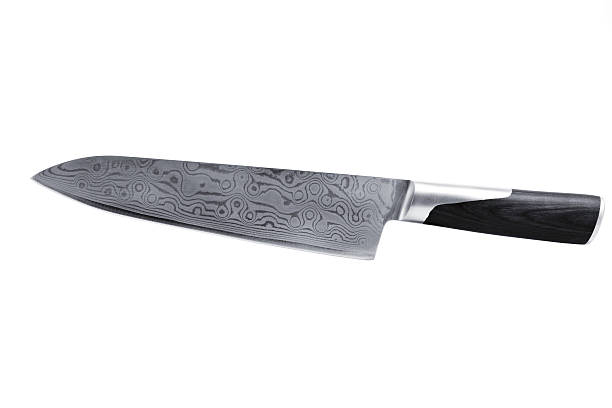DAMASCUS KNIFE CARE

Real Damascus knives are not just kitchen utensils, they are highly professional chef’s tools. The process and result of cooking directly depend on its functionality and quality of cut, so true craftsmen and professional chefs follow important recommendations for care and storage.
Washing and cleaning tips
Any kitchen knife is not recommended to be washed in the dishwasher. Otherwise, under the influence of high water temperature, hot air during drying, and aggressive chemicals, there is a high risk of violating the technical characteristics of the knife. Also, regular machine washing threatens with premature destruction of the material structure of the handle and the cutting edge. The knife will not only lose its external gloss but will quickly become dull.
Since it is necessary to wash Damascus knives by hand, take note of the following recommendations:
- rinse the knife immediately after use, do not store in the sink to reduce the time of contact with food residues and water;
- after washing, it is necessary to wipe the knife dry;
- put in a dedicated storage area.
After washing, the knife must be dried. It is recommended to wipe the high carbon steel blade immediately with a dry, clean cloth or paper towel. The fact is that tap water contains chlorine and other chemical components in a small amount, but is sufficient so that after the drops have dried, difficult-to-remove stains remain on the blade.
After the tool dries, it is recommended to rub the blade again to mirror smoothness. If necessary, you can use special tools to care for the steel of the blade (camellia oil or castor oil). But folk cleaning methods (using sunflower oil, salt, lemon, onion, soda, and others) are unacceptable.
Caring for Damascus knives – storage rules
Even if you constantly use the blade, store it separately from other tools, including knives. The blade (edge) should not come into contact with other metal objects. We recommend You can store them in:
- in a separate compartment of the box;
- in a special block with notches for knives;
- on a magnetic holder;
- in a case made of wood, plastic, or in an individual case;
- Supplied with separate pockets for each knife.
Only in this way will you be able to avoid scratches on the handle and damage on the cutting edge of a professional tool. In addition, these storage rules will help minimize the likelihood of cuts when removing a knife or other utensils lying nearby. The cutting edge of these blades is very sharp, so even a slight accidental touch can lead to a cut.
Wooden handles are also periodically recommended to be rubbed with special products (linseed oil, wood oils, resins, beeswax) to maintain practical properties.
You can find even more accessories for storing Damascus knives on our website Damascus1
Nuances of application
You need to use a knife taking into account several nuances. In general, these are logical recommendations that are suitable for any knife, but in the care of a professional tool, they are especially important. Take note of the following rules:
Highly specialized knives
Highly specialized knives should be used for their intended purpose. A sushi knife should not be used to cut large pieces of meat or cut bread. At a minimum, this is inconvenient, and at a maximum, it can lead to damage to the blade or product.
Kitchen knives
Kitchen knives are not intended for chopping bones, cutting frozen foods, crushing ice, or opening cans. The sharp tip of the blade is especially vulnerable because this is the thinnest part. The high carbon content of the steel makes the knife extremely hard and sharp but reduces its flexibility. If a cheap blade from China simply bends, then a Damascus knife may even break when used for other purposes.
- Utility knives
- fillet knives
- Fish knives
- meat knives
- carving knives
- Freezing knives
Suitable for cutting boards
Suitable for cutting boards made of plastic and wood. Hard surfaces quickly dull the cutting edge, so cutting on metal, glass, stone, ceramic surfaces is not worth it. It is also not recommended to throw cut food off the board with a blade. It is better to brush off the products with the butt of a knife.
Also, note that ceramic knives are especially sensitive to mechanical damage. Chips, cracks can occur from hitting a sink or falling to the floor. The ceramic blade may break from a strong blow. Do not use them for grinding hard foods, chopping or cutting bones, hard cheeses. But for cutting mushrooms, vegetables, sausages, meat, bread, they are ideal.
How to sharpen Damascus knives?
Any blade sooner or later needs editing and sharpening. The blade of the Damascus blade is hard and sharp and does not need to be re-sharpened for a long period. Rumor has it that these blades are self-sharpening – just a marketing ploy. Damascus knives are sharpened with special water stones of varying degrees of graininess. For self-sharpening, you need to know the sharpening angle and the initial sharpness (number of grits).
finishing the blade
It is with this indicator that a water stone is needed for finishing the blade. Ceramic knives need to be treated with diamond-coated bars. There are also universal sharpeners… You can also order sharpening a Damascus knife from professional craftsmen. If the work is carried out with high quality, the knife will not require an “update” for several more months or even years.
A real Damascus knife is a professional tool that will last for many years, faithfully, if you provide it with proper care. Follow these simple care instructions to keep your knife looking great and performing great for a long time.
If you liked our atricle or you missed it or you think it could be better, you can express your opinion in the comment box of the article.Thank you.
If you want to know anything about knives or buy anything, you can do so by visiting our website Damascus1 on our website you will find everything related to knives.
Read more
Benefits of Damascus Pocket Knife






